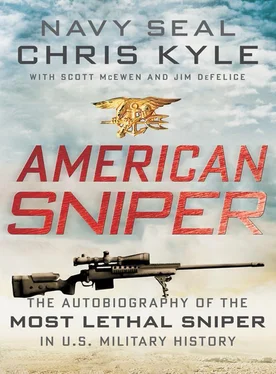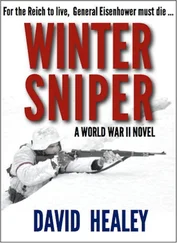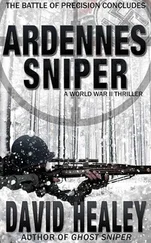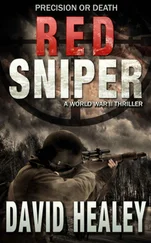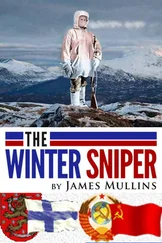At some point I saw a one-story house with someone moving on the roof. It was about 2,100 yards away, and even with a twenty-five power scope I couldn’t make out much more than an outline. I studied the person, but at that point he didn’t seem to have a weapon, or at least he wasn’t showing it. His back was to me, so I could watch him, but he couldn’t see me. I thought he was suspicious, but he wasn’t doing anything dangerous, so I let him be.
A little while later an Army convoy came down the road beyond the other village, heading in the direction of the COP we had staged out of. As it got closer, the man on the roof raised a weapon to his shoulder. Now the outline was clear: he had a rocket launcher, and he was aiming it at Americans.
RPG.
We had no way of calling the convoy directly—to this day I don’t know exactly who they were, except that they were Army. But I put my scope on him and fired, hoping to at least scare him off with the shot or maybe warn the convoy.
At 2,100 yards, plus a little change, it would take a lot of luck to hit him.
A lot of luck.
Maybe the way I jerked the trigger to the right adjusted for the wind. Maybe gravity shifted and put that bullet right where it had to be. Maybe I was just the luckiest son of a bitch in Iraq. Whatever—I watched through my scope as the shot hit the Iraqi, who tumbled over the wall to the ground.
“Wow,” I muttered.
“You dumb lucky fucker,” said LT.
Twenty-one hundred yards. The shot amazes me even now. It was a straight-up luck shot; no way one shot should have gotten him.
But it did. It was my longest confirmed kill in Iraq, even longer than that shot in Fallujah.
The convoy started reacting, probably unaware of how close they’d come to getting lit up. I went back to scanning for bad guys.
As the day went on, we started taking fire from AKs and rocket-propelled grenades. The conflict ratcheted up quickly. The RPGs began tearing holes in the loose concrete or adobe walls, breaking through and starting fires.
We decided it was time to leave and called for extraction:
Send the RG-33s! (RG-33s are big bulletproof vehicles designed to withstand IEDs and equipped with a machine-gun turret on the top.)
We waited, continuing the firefight and ducking the insurgents’ growing spray of bullets. Finally, the relief force reported that it was five hundred yards away, on the other side of the soccer field.
That was as close as they were getting.
A pair of Army Hummers blew through the village and appeared at the doors, but they couldn’t take all of us. The rest of us started to run for the RG-33s.
Someone threw a smoke grenade, I guess with the thought that it would cover our retreat. All it really did was make it impossible for us to see. (The grenades should be used to screen movement; you run behind the smoke. In this case, we had to run through it.) We ran from the house, through the cloud of smoke, ducking bullets and dodging into the open field.
It was like a scene from a movie. Bullets sprayed and plinked into the dirt.
The guy next to me fell. I thought he’d been hit. I stopped, but before I could grab him, he jumped to his feet—he’d only tripped.
“I’m good! I’m good!” he yelled.
Together we continued toward the trucks, bullets and turf flying everywhere. Finally, we reached the trucks. I jumped into the back of one of the RG-33s. As I caught my breath, bullets splashed against one of the bulletproof windows on the side, spiderwebbing the glass.
Afew days later, I was westward-bound, back to Delta Platoon. The transfer I’d asked for earlier was granted.
The timing was good. Things were starting to get to me. The stress had been building. Little did I know it was going to get a lot worse, even as the fighting got a lot less.
By now, my guys had left al-Qa’im and were at a place called Rawah, also out west near the Syrian border. Once again they’d been put to work building barracks and the rest.
I got lucky; I missed the construction work. But there wasn’t much going on when I arrived, either.
I was just in time for a long-range desert patrol out on the border. We drove out there for a few days hardly seeing a person, let alone insurgents. There had been reports of smuggling across the desert, but if it was going on, it wasn’t going on where we were.
Meanwhile, it was hot . It was 120 degrees at least, and we were driving in Hummers that had no air-conditioning. I grew up in Texas, so I know warm; this was worse. And it was constant; you couldn’t get away from it. It hardly cooled off at night—it might fall to 115. Rolling down the windows meant taking a risk if there was an IED. Almost worse was the sand, which would just blow right in and cover you.
I decided I preferred the sand and IED danger to the heat. I rolled down the windows.
Driving, all you saw was desert. Occasionally, there would be a nomad settlement or a tiny village.
We linked up with our sister platoon, then the next day we stopped at a Marine base. My chief went in and did some business; a little while later he came out and found me.
“Hey,” he told me, grinning. “Guess what—you just made chief.”
Ihad taken the chief’s exam back in the States before we deployed.
In the Navy, you usually have to take a written test to get promoted. But I’d lucked out. I got a field promotion to E5 during my second deployment and made E6 thanks to a special merit program before my third deployment. Both came without taking written tests.
(In both cases I had been doing a lot of extra work within the Team, and had made a reputation on the battlefield. Those were the important factors in awarding the new ranks.)
That didn’t fly for the chief’s exam. I took the written test and barely passed.
Ishould explain a bit more about written tests and promotions. I’m not unusually adverse or allergic to tests, at least no more than anyone else. But the tests for SEALs added an extra burden.
At the time, in order to get promoted, you had to take an exam in your job area—not as a SEAL, but in whatever area you had selected before being a SEAL. In my case, that would have meant being evaluated in the intelligence area.
Obviously, I wasn’t in a position to know anything about that area. I was a SEAL, not an intelligence analyst. I didn’t have a clue what sort of equipment and procedures intel used to get their jobs done.
Considering the accuracy of the intel we usually got, I would have guessed dartboard, maybe. Or just a fine pair of dice.
In order to get promoted, I would have had to study for the test, which would have involved going to a secure reading area, a special room where top-secret material can be reviewed. Of course, I would have had to do this in my spare time.
There weren’t any secure reading areas in Fallujah or Ramadi where I fought. And the literature in the latrines and heads wouldn’t have cut it.
(The tests are now in the area of special operations, and pertain to things SEALs actually do. The exams are incredibly detailed, but at least it has to do with our job.)
Becoming a chief was a little different. This test was on things SEALs should know.
That hurdle cleared, my case had to be reviewed by a board and then go through further administrative review by the upper echelon. The board review process included all these chief petty officers and master chiefs sitting down and reviewing a package of my accomplishments. The package is supposed to be a long dossier of everything you’ve done as a SEAL. (Minus the bar fights.)
Читать дальше
